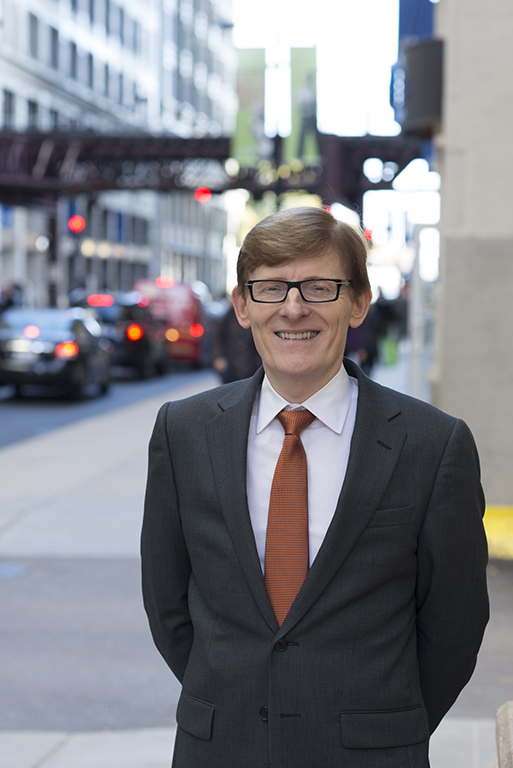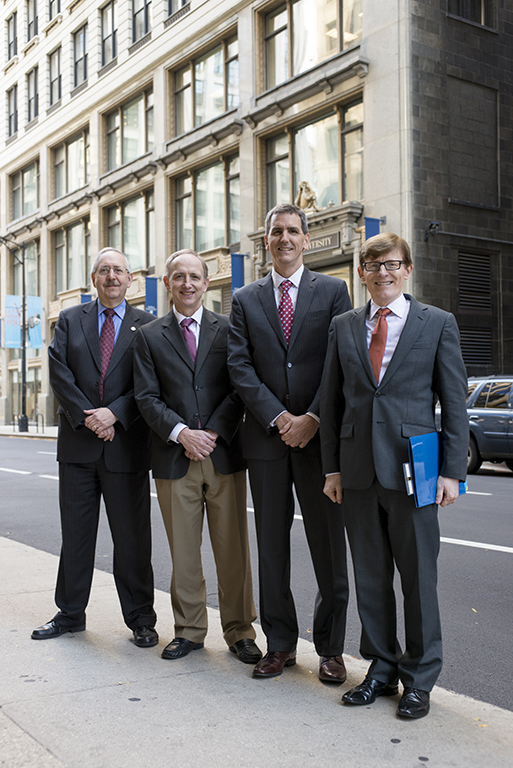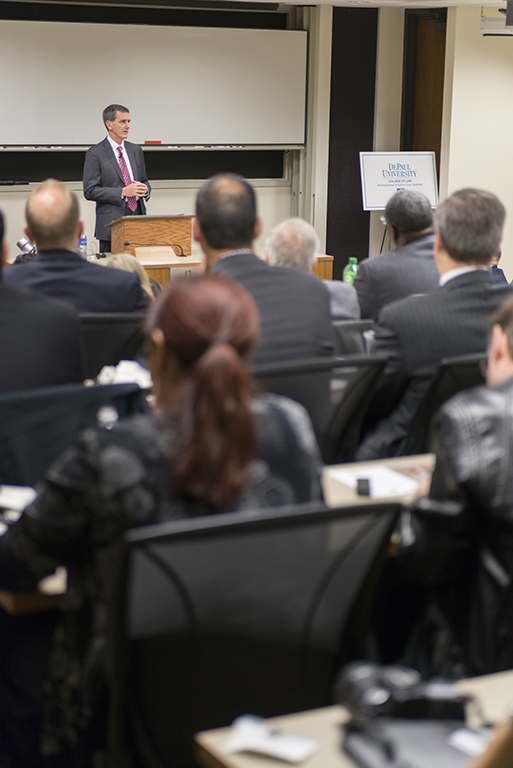
It’s a little-known fact that DePaul offered some of the first aviation law courses in the country, along with professors who specialized in the field.
“I was wandering in the library here one day and I came across a bound volume of the lectures of a DePaul professor in aviation law from around 1940,” recalled International Aviation Law Institute (IALI) Director and Distinguished Research Professor of Law Brian F. Havel. “It even preceded the Chicago Convention of 1944, which is the fundamental law of international aviation.”
In the 1920s, College of Law Professor John William Curran taught law of agency, equity jurisdiction and trusts—and served as an early authority in aviation law. Georgetown Law Journal published Curran’s review of Carl Zollman’s CASES ON AIR LAW in March 1930. “Besides being the nucleus of a course in ‘air law,’” Professor Curran penned in the review, “this volume should prove useful to the practitioner.”
In 1932, DePaul added two summer aviation law courses, as well as Zollman’s book, to its evening division curriculum (DePaulia archives cite James Cherry as professor).
However, the fledgling field had its skeptics. By 1936, the Association of American Law Schools no longer considered the subject important enough to get its own entry. DePaul’s aviation curriculum quieted and, with the exception of Professor Stanley B. Rosenfeld’s 1970 course, air law took to the hangar.
“Aviation law had almost disappeared as a subject of study in the 1970s and 1980s—and some of the 1990s,” explained Havel. “We were surprised by that. We felt that we were stepping into a fine tradition here and that DePaul had always had a place in the study and the scholarship of international and domestic aviation law. We thought it was appropriate to pick up the reins of their good work.”
Stuart Banner’s history of airspace, WHO OWNS THE SKY (Harvard University Press 2008), discusses this initial rise, and subsequent fall, of aviation law in the United States, citing DePaul’s curriculum in the company of programs from Northwestern University School of Law and Vanderbilt University Law School.
Early aviation law proponents saw the field as “marked by the absence of ancient and inflexible methods and rules and impenetrable precedents,” wrote Banner. “Not just a specialized kind of practice, but a new field of law.”
This sentiment resonates with IALI Director Brian F. Havel. “I felt that aviation law, like the industry itself, was exceptional,” he said. “The philosophical approach of the subject is different from what we normally encounter in international law. It has an unusual combination of international and domestic law and, obviously, it has to manage highly complex issues like the supply of air transport services across borders, which means that it deals directly with issues of sovereignty and issues of collaboration between states for a greater good.”
Visionary leadership
As the son of renowned Czech glass master Miroslav Havel, who left for Ireland following World War II to become founding chief designer for Waterford Crystal, Professor Havel’s calling in aviation law wasn’t writ large. Havel won a debate tournament in his final year at Dublin’s University College that launched him on a debate tour of U.S. universities.
During his visit to New York, he accepted an on-the-spot offer for an internship at a Manhattan law firm. He never returned to work in Ireland. Havel pursued two graduate law degrees at Columbia University in New York, practiced transnational corporate and antitrust litigation at New York firm Paul Weiss Rifkind Wharton & Garrison and then came to DePaul.
Over the course of his tenure at IALI, Havel has been Keeley Fellow at Wadham College, Oxford, as well as visiting professor at Oxford, at Leiden University in the Netherlands and at his original alma mater, University College Dublin. He was also named Fulbright Distinguished Visiting Professor of Comparative Law and Legal Pluralism at McGill University Faculty of Law. He is a board member of the European Air Law Association and vice chair of the Advisory Board of the International Institute of Air and Space Law at Leiden.
“He has boundless energy and an ability to manage so many diverse things at the same time—it’s amazing to watch,” said IALI Executive Director Stephen Rudolph (JD ’97). “He is inspired… and he can inspire others to do great things.”
Havel is a progressive thinker who is drawn to the imaginative foundations of his field. He describes airports as transcendent entities and his academic oeuvre includes interdisciplinary scholarship like “In Search of a Theory of Public Memory: The State, the Individual, and Marcel Proust” in the Indiana Law Journal (2005).
“He is sought after by the media because the depth of his knowledge is such that he can speak on these issues extemporaneously,” said Rudolph.
Havel is often solicited around the world for his skills as a lecturer on civil aviation. Indeed, the seeds of the International Aviation Law Institute trace back to one such conference. At the 2003 International Air Transport Association conference in Singapore, Havel fell into discussion with IALI Co-Director Michael S. Jacobs, DePaul professor and internationally recognized expert in antitrust and competition law. The scholars agreed on the value of aviation law study at DePaul and began laying the groundwork for the institute.
A decade later, IALI serves as a beacon for aviation experts and students in the Midwest—and worldwide. This visibility is evidenced by the institute’s advisory board, which includes top-level authorities from around the globe.
Great ground-floor strides
From its single seminar class in 2004, the institute has greatly enriched its academic presence. IALI’s developments include new course offerings, the only LLM concentration in International Aviation Law in the United States, and a proposed Master of Jurisprudence program for non-attorneys. In fact, DePaul is

only the third school in the world to offer a graduate law degree in international aviation law, along with Leiden and McGill.
IALI also owes its success to an amalgam of niche experts. John Q. Mulligan is an adjunct professor and the institute’s third FedEx/United Airlines Resident Research Fellow. In addition to teaching, Mulligan conducts high-level research supporting other IALI faculty members.
Mike Jacobs brings highly specialized expertise to the institute. “When competition law comes into play in Asia or the EU,” Rudolph stated, “Jacobs is a highly sought after authority.” Jacobs continues to serve as a distinguished speaker on IP/antitrust issues abroad, most recently in Singapore.
Current Interim Dean and IALI Co-Director Bruce Ottley joined the institute in 2011, contributing instrumental knowledge in tort litigation—in aviation, this extends to personal injury, wrongful death and products liability— and civil procedure.
“My first day at DePaul as a student was Brian Havel’s first day as a professor,” recalled Rudolph. At the College of Law, he served as lead research assistant and project manager for Havel’s first book, IN SEARCH OF OPEN SKIES: LAW AND POLICY FOR A NEW ERA IN INTERNATIONAL AVIATION (Kluwer Law International 1997).
Following graduation, Rudolph worked as an editor specializing in aviation law at legal publisher CCH Incorporated. He started an advisory board and invited Professor Havel to chair and appoint the members. The cache of talent included Kenneth P. Quinn (JD ‘85), former chief counsel of the Federal Aviation Administration (FAA) and protégé of former U.S. Secretary of Transportation Sam Skinner (JD ’66), as well as former Virginia governor and noted transport advocate Gerald L. Baliles. In 2001, Baliles and Rudolph cofounded the journal Issues in Aviation Law and Policy.
In 2007, with leadership changing at CCH, Rudolph arranged to relocate the journal to DePaul’s aviation institute. “Six weeks later,” he said, “I took an age-55 retirement from CCH and came to work here as executive director of the institute.” He laughs, “And I’m still the journal’s managing editor.”
Broadening horizons
One of Havel's early initiatives, the "Conversations with Aviation Leaders" oral history project brings an expanding sphere of aviation scholars to DePaul. Picking up from the Airline Deregulation Act of 1978, the series explores what led to—and what has come out of—what Havel refers to as a “social experiment” in deregulation. Initial interviewees included the late Fred Kahn, the chairman of the Civil Aeronautics Board; and former president and CEO of New York Air Mike Levine. More have followed.

The most recent conversation was with FedEx president and founder Fred Smith. In collaboration with DePaul’s Chaddick Institute for Metropolitan Development director, Professor Joseph P. Schwieterman, the institute also produces the IALI/Chaddick Lunch Lecture series. Now in its fourth year, the event features a guest specialist discussing airports, air traffic or intermodal transportation, which are areas of concern for both institutes. It regularly caps out at 100 guests.
But the heart of the institute is its vibrant academic program.
“One of the most exciting aspects of the aviation courses was the fact that the institute attracted high profile guest speakers from the aviation community,” said Thomas Wangard (JD ’13), an attorney focusing on aviation accident litigation and FAA enforcement actions at Condon & Forsyth in New York.
“Thanks to DePaul’s aviation institute, I was able to attend an international aviation law conference in China, clerk with the FAA and work for a firm that handled aviation cases.”
Last spring, IALI introduced a new course, International Aircraft Financing Law, to more than a dozen students, many of whom were working professionals.
“We’ve started attracting people who are already practicing in the field, which is something we’d like to do more often,” said Rudolph. IALI is in the process of introducing more academic initiatives, including an aviation products liability course to be offered this spring.
Institute ideals
“One of the things that we’ve promoted at the institute is the idea of a more liberal international economic environment for the aviation industry,” Havel said.
Havel has delved intensely into the law of the European Union and likes to make comparisons with the United States. “The EU has aviation as a priority,” he explained. “A lot of the effects of regional economic integration pursed by the EU have been demonstrated through the aviation industry.”
Under Havel’s wing, the institute was deeply involved in the historic 2007 Open Skies air transport agreement with the European Union, a negotiation between the United States and the EU that yielded what some have called the world’s most liberal aviation agreement.
IALI held workshops and conferences to discuss the plan. Chief U.S. negotiator John Byerly, former State Department deputy assistant secretary for transportation affairs, has since joined the IALI board and visits annually for lectures and gatherings as a scholar-in-residence.
“Another one of the issues I’ve taken up as part of the theme for the institute is to investigate the relationship between government and the airline industry on the level of what I call ‘smart regulation,’” Havel said. His new book THE PRINCIPLES AND PRACTICE OF INTERNATIONAL LAW (Cambridge University Press 2014) elaborates on this concept.
Regulations do have the capacity to change the nature of the industry, Havel explains, if they are wise
regulations—if they’re not simply governmental impositions on the business models of the airlines, but actually create the possibility of new business models. “It’s ironic that this industry serves international trade and creates opportunities for international mergers and acquisitions, but is everywhere restricted by an archaic regulatory system that doesn’t allow foreign ownership of airlines,” he remarked.
“We’re looking at all of that, not necessarily because we’re beating the drum for the airlines, but because we’re looking at what is rational in terms of regulation. I think it’s a fascinating subject and I think that the students welcome the opportunity to see how the world’s most visible service industry is constructed and how it might be reconstructed in the future.”
Taking off
“One of the things I like about our DePaul graduates is that they’re always blessed with a sense of initiative,” Havel said. “Many of my students have taken off around the world and have become proficient in the law, the culture and the business practices of other countries. I can think of at least a dozen students who have done this in the last few years.”
Alumnus Cade Miller (LLM ’13), now an attorney with the FAA, is duly prepared to return the compliment. “Without a doubt, I would not be where I am in my career had I not attended DePaul,” he said.
“The institute prepared me to succeed in many different areas within the aviation industry. I use the knowledge I gained from the Public International Aviation Law course almost every day at work. The courses helped to create an understanding of how complex aviation policy and regulation can be. Class discussions that we had on aviation policy allow me to participate in many complex FAA discussions at work, including those on unmanned aircraft systems.
“As part of the Field Placement Program, I was able to clerk at the FAA Great Lakes Region. The connections and experience from this clerkship were integral to my hiring at the FAA as an attorney.”
Similarly, the future for aviation law looks busy.
“On the regulatory side there is economic regulation and antitrust regulation through various departments of government,” said Rudolph. “You also have safety regulation, the FAA (which licenses and supervises pilots, airlines and aircraft mechanics and repair stations), and you have—especially since 9/11—the TSA and all of the security issues—those are regulatory parts of the industry. The newest area, of course, is unmanned aircraft systems, known to the public as ‘drones.’ There are attorneys needed in all of those areas.”
Most recently, Havel joined a high-level EU panel alongside the U.S. Secretary of Homeland Security (his former Paul, Weiss colleague Jeh Johnson) and participated in an EU Passenger Rights Workshop in Belgium marking the 10th anniversary of the European Union’s air passenger rights legislation.
Along the celebratory continuum, the institute recently commemorated the 70th anniversary of the Convention on International Civil Aviation, the Chicago Convention, at the Hilton Chicago hotel on Michigan Avenue, where it was negotiated and signed in December 1944. One of the few originals of the 1944 Convention text, bequeathed to IALI by emeritus professor and founder of the International Human Rights Institute, M. Cherif Bassiouni, was displayed prominently at the commemoration.
On the cusp of this momentous milestone, and with many more on the horizon, DePaul’s IALI will soon celebrate its own 10-year anniversary in friendly skies.